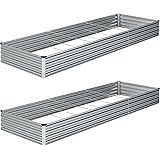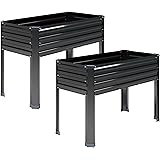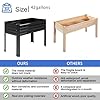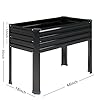ZUNUDA Galvanized Raised Garden Bed,2 Pcs 10×3×1FT Metal Planting Box for Outdoor Vegetable, Herb,Planter Gardening (Silver)
$75.77 (as of 15:02 GMT -05:00 - More infoProduct prices and availability are accurate as of the date/time indicated and are subject to change. Any price and availability information displayed on [relevant Amazon Site(s), as applicable] at the time of purchase will apply to the purchase of this product.)DIIYIV Galvanized Raised Garden Bed with Legs,2PCS 48×18×30in Elevated Planter Box for Backyard,Garden, Patio, Balcony, 300lb Capacity,Planters for Outdoor Plants,Black
$99.99 (as of 13:55 GMT -05:00 - More infoProduct prices and availability are accurate as of the date/time indicated and are subject to change. Any price and availability information displayed on [relevant Amazon Site(s), as applicable] at the time of purchase will apply to the purchase of this product.)Composting is a simple and effective way to reduce food waste while creating nutrient-rich fertilizer for your garden. In this blog post, we’ll explore the joy of composting, including what it is, why you should do it, how to get started, tips for success, and troubleshooting common problems. Let’s dive in!
Introduction to Composting: What It Is and Why You Should Do It
Composting is the process of breaking down organic matter into a rich soil amendment that can be used to nourish plants. By composting your food waste, you are reducing the amount of material sent to landfills where it contributes to greenhouse gas emissions. Instead, you can turn those leftovers into a valuable resource for your garden.
The Benefits of Composting for Your Garden and the Environment
In addition to reducing food waste, composting offers several benefits for both your garden and the environment. Here are just a few:
Improved soil health: Compost adds essential nutrients to the soil, improves its structure, and helps retain moisture.
Reduced water usage: By adding compost to your garden beds, you can reduce the amount of water needed to keep your plants healthy.
Fewer pests: Composting encourages beneficial insects that help control pest populations in your garden.
Lower carbon footprint: By diverting food waste from landfills, you are helping to reduce methane emissions, which contribute significantly to climate change.
How to Get Started with Composting: Choosing a Bin, Collecting Materials, and Setting Up Your System
Getting started with composting is easy! Here are some steps to follow:
Choose a bin: There are many types of compost bins available, ranging from simple wooden boxes to more complex tumblers. Consider factors such as size, cost, and ease of use when choosing a bin.
Collect materials: To start composting, you will need three main ingredients: browns (dry materials like leaves or shredded paper), greens (wet materials like food scraps or grass clippings), and air. Make sure to balance these materials correctly to ensure successful composting.
Set up your system: Once you have chosen a bin and collected materials, it’s time to set up your composting system. Follow the instructions provided by your bin manufacturer, but generally, you will want to create a layered system of browns and greens, alternating between the two until you reach the top of the bin. Finish off with a layer of browns on top.
Tips for Successful Composting: Maintaining the Right Balance of Greens and Browns, Aerating Your Pile, and Monitoring Moisture Levels
To ensure successful composting, there are a few key tips to follow:
Maintain the right balance of greens and browns: A good rule of thumb is to aim for a ratio of 2 parts brown to 1 part green. This ensures that your pile has enough nitrogen (from the greens) to fuel the decomposition process, while also providing enough carbon (from the browns) to absorb excess moisture and maintain aeration.
Aerate your pile regularly: Turning your compost pile helps to introduce oxygen into the mix, which is necessary for microorganisms to break down the material effectively. Use a pitchfork or other tool to turn your pile every couple of weeks.
Monitor moisture levels: If your pile is too dry, it won’t decompose properly. On the other hand, if it’s too wet, it could become smelly and attract pests. Check your pile periodically to make sure it has the right level of moisture.
Troubleshooting Common Composting Problems: Dealing with Odors, Pests, and Slow-to-Decompose Materials
Even experienced composters sometimes encounter challenges along the way. Here are some common issues and solutions:
Odors: If your compost pile starts to smell bad, it may be due to excess moisture or an imbalance of greens and browns. Try turning your pile to introduce more oxygen, or adjust the ratio of materials to improve aeration.
Pests: Rodents and flies can be drawn to compost piles. To discourage them, avoid using meat or dairy products in your compost, and cover your pile with a tarp or other barrier to prevent access.
Slow-to-decompose materials: Some materials, such as corn husks or wood chips, can take longer to break down than others. To speed up the process, try chopping or shredding these materials before adding them to your pile.
Conclusion: The Joy of Composting and How to Stay Motivated
Composting is not only good for the environment, but it can also be a rewarding hobby. By following best practices and staying motivated, you can enjoy the satisfaction of turning food waste into nutritious fertilizer for your garden. And remember, even if you encounter challenges along the way, don’t give up – with persistence and attention, you can achieve successful composting results.













































